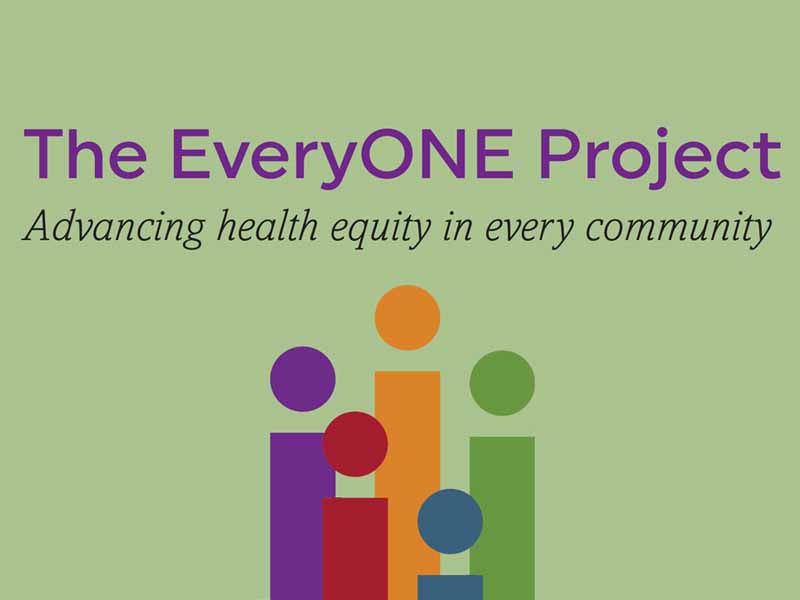The EveryONE Project Unveils Team-based Resources
AAFP's Signature Health Equity Initiative Continues to Evolve
April 06, 2018, 10:11 am Chris Crawford – Social determinants of health (SDOH) -- the conditions under which people are born, grow, live, work, age and die -- account for a substantial proportion of health outcomes (30 percent to 55 percent) and are the primary driver of health inequalities.

This unfortunate reality led the AAFP to create The EveryONE Project last year, with the goal of advancing health equity by
- promoting evidence-based strategies that support community and policy changes,
- creating tools to help family physicians and their teams advocate for health equity, and
- collaborating with others who share these values.
To help family physicians modify their practices to better address their patients' SDOH, The EveryONE Project has released its latest toolkit and implementation guide, Addressing Social Determinants of Health in Primary Care: Team-based Approach for Advancing Health Equity.
"As the leading providers of primary care in underserved areas, family physicians see the impact of social determinants of health every day," said Kevin Kovach, Dr.P.H., M.Sc., population health manager in the AAFP Health of the Public and Science Division. "The AAFP's new guide provides recommendations and resources that family physicians and their practice teams can use to address their patient's social determinants of health."
Story Highlights
Implementation Guide Details
Kovach told AAFP News the first part of the implementation guide focuses on fostering a practice culture that values health equity.
Establishing such a culture should include learning more about patients' communities, the guide noted. It recommends starting by asking basic questions, such as
- What barriers do your patients face to good health?
- What resources are in their communities that can enhance their health?
Additionally, the guide says this health equity-focused culture should include
- learning about the impact social factors have on health outcomes and the processes through which they influence health status;
- uncovering implicit biases health care team members may harbor, as well as working to understand how these biases impact patient care and how to mitigate them to improve care;
- empowering all staff to think about how they can address patients' SDOH and improve health equity; and
- incorporating health literacy and medical interpretation.
"The guide then provides resources for assessing how social determinants of health could be integrated into your workflow," Kovach said. "Separate worksheets are provided to help you work with your team members to determine the best approach for your unique practice."
The implementation guide offers a practice assessment questionnaire to help practices determine what changes they may wish to make to their practice environment and workflow.
A patient flow evaluation form helps family physicians evaluate how patients move through their offices, allows them to assess the best opportunities to address patients' SDOH, and then offers them a sample patient visit workflow to assist them in revising their own workflow to better incorporate SDOH.
The implementation guide also suggests various resources practices can use to examine how contextual factors in patients' communities affect their health and helps determine barriers practices might face to addressing SDOH, along with steps to define and implement a new system to better meet these needs.
The EveryONE Project recommends using the Identify, Ask and Act framework so every member of the practice team has the opportunity to intervene with a patient at every visit.
"This approach encourages family physicians to identify what resources are in their patients' communities, ask their patients about their SDOH and act to help connect patients with resources that can help address their patients' social needs," the guide notes.
Implementing SDOH Framework
After the practice team gains an understanding of how to address SDOH in the office, everything must be standardized, including integrating SDOH screening questions into the electronic health record, the guide explains.
Additional strategies should be formalized to refer patients to community resources, figure out what each team member's role is in addressing SDOH and create a process to get feedback from staff on how things are going.
The EveryONE Project's implementation guide concludes with an implementation plan worksheet/checklist family medicine practices can use to begin the journey of addressing their patients' SDOH.
Coming Next From The EveryONE Project
In January, The EveryONE Project released its first resource, a set of initial screening tools to help family physicians recognize and respond to various social factors that impact their patients' health.
So, what's next?
This summer, the AAFP will release a third installment of The EveryONE Project toolkit to equip family physicians with information and resources to connect their patients to community-based services to address their SDOH.
"Family physicians frequently share that they often aren't aware of existing or new services that they can provide to patients as a solution to the issues identified by SDOH screening," said Danielle Jones, M.P.H., manager of the AAFP's Center for Diversity and Health Equity, which operates The EveryONE Project. "The AAFP aims to address this gap by partnering with Aunt Bertha, a nationwide online community resource search network."
Additionally, Jones said, the AAFP intends to empower family physicians with strategies on actively engaging with other individuals and organizations to foster multisector collaborations that champion community-level health equity initiatives.
Finally, said Kovach, in the fall, the AAFP will release its fourth installment of The EveryONE Project toolkit, which will focus on opportunities for family physicians and their practice teams to engage with their communities to advocate for local changes that support health equity.
Related AAFP News Coverage
Report Shows Health Disparities by County, Demographics
(3/27/2018)
National Health Policy Conference
Keynote Spotlights Community Work on Social Determinants
(2/9/2018)
The EveryONE Project Unveils Social Determinants of Health Tools
(1/9/2018)